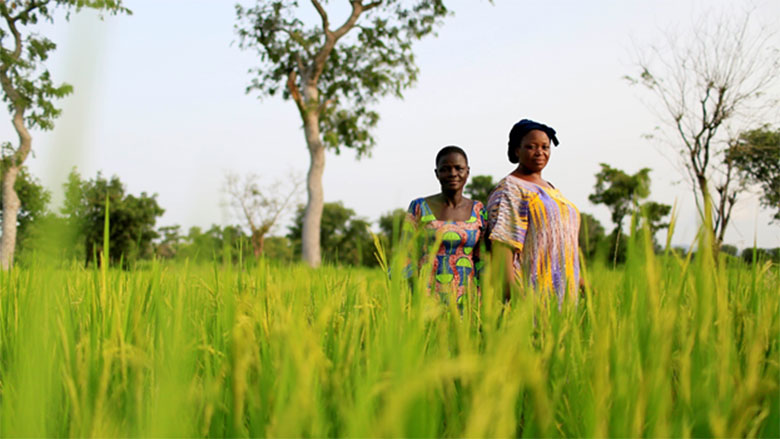Anié, January 28, 2020 - It's market day in Anié, a commercial town 200 km north of Lomé. The morning rush for breakfast is even greater in front of Anifa Aboubacar's gargote. Customers of all ages line up for her "watché". For more than 20 years, she has been cooking this African Cantonese rice with white beans and fried chillies, which is very popular in several West African countries. And she doesn't mess around with the recipe: "Real watché is made with parboiled rice. Here in Anié, we've always respected this tradition.
News
CORAF is an important organization working to improve food and nutrition security in West Africa. CORAF's recent initiatives are a promising sign of its determination to meet the challenges facing West Africa.
In Togo, a cooperative of women farmers successfully launches 100% premium rice

Published on: 29/01/2020
"Mrs. Kadokalih, cooperative member: "I am a widow and can finally take care of my family.
Steamed after harvest to preserve its vitamins and minerals, parboiled rice holds no secrets for the women of Anié, most of whom excel in the traditional processing of local rice. But one group of women stands out from the rest: the Femmes vaillantes d'Anié. Created in 2007 by 12 women farmers, this cooperative produces superior quality parboiled rice. "Before, we used to parboil unhusked rice by pouring it directly into a pot filled with water, which led to a lot of losses and residues," explains Ebiro Kadokalih, president of the association. "But today, we have a real parboiler that allows us to have rice that is free of kernels and cleaner."
The improved parboiler was a gift from the West African Agricultural Productivity Project (PPAAO), which also trained them in techniques for producing top-quality parboiled rice. The results are in. Ebiro and his colleagues have almost trebled their yield, producing 800 kilos of parboiled rice a week, with zero wastage. The work has become less arduous, less messy, and faster. This time-saving has enabled them to improve the packaging and presentation of their rice, which they now sell under the parboiled rice label of the Coopérative femmes vaillantes d'Anié.
A more affluent clientele from afar
For Ebiro, this marketing effort attracts a more affluent and demanding clientele: "We deliver mainly to the Maison des Soeurs Religieuses in Anié, and more and more customers are coming from Lomé, the capital.
"I now only buy rice from Femmes Vaillantes, which I discovered when I arrived in Anié two years ago, and which I appreciate for its quality and taste," says Sister Georgette, the dean of the Franciscan sisters' house in Anié. "I also help the cooperative to supply many other congregations who ask me when they taste the rice at my house".
For the time being, the cooperative's office and production site are housed in the president's family compound. But the Femmes vaillantes are thinking big and planning to build a large-scale processing center.
Thanks to the profits from its increased sales volume, the cooperative has acquired a two-hectare estate in the hamlet of Sevia, some ten kilometers from Anié. The aim? To increase its yield. Once again, the PPAAO came to the rescue: "The project helped me go to Mali for training in intensive rice-growing techniques", confides Ekouya Adoukonou, president of the Femmes vaillantes supervisory committee, who now employ two seasonal workers to plough and maintain the collective field. "When I returned, I trained the other members of the cooperative, in particular on the transplanting technique, which has taken us from two to seven tonnes of rice per hectare."
The daily lives of Ekouya, Ebiro and their colleagues are less uncertain now that their cooperative has become a dynamic small business. "I'm a widow now, and I'm finally able to look after my family," says cooperative member Madame Kadokalih. "Above all, I'm able to pay for school for all my children.
Financed to the tune of $32.8 million by the World Bank, through the International Development Association, the West African Agricultural Productivity Project (PPAAO) has already supported 10 women's rice parboiling cooperatives and had a direct impact on the lives of over 227,000 Togolese women.

Credit @ World Bank
Other news
View allTowards a strengthening of CORAF's actions in...
A delegation from CORAF, led by its Chairman of the Board, Dr Kalifa TRAORÉ, its Executive Director, Dr Moumini SAVADOGO, and its...
A strong plea for African women entrepreneurs...
Many women in West and Central Africa live in an unfavorable environment, with limited access to information,...
CORAF strengthens its partnerships in Burkina Faso...
As part of its mission to strengthen institutional and technical collaboration, a delegation from CORAF, led by its Director,...
Training today's and tomorrow's researchers:...
When AMABA Akéta Akpadji Rébecca completed her Master's degree in Plant Biology in Togo, she was faced with uncertainties about...